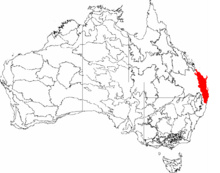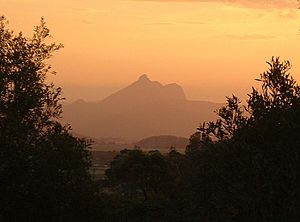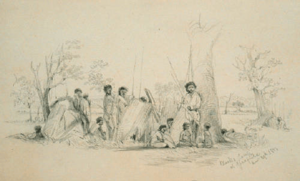Bundjalung people facts for kids
Quick facts for kids Bundjalung people |
|
|---|---|
| Aka: Badjalang (Tindale)(Horton) Bandjalang (SIL) |
|

South Eastern Queensland bioregion
|
|
| Hierarchy | |
| Language family: | Pama–Nyungan |
| Language branch: | Bandjalangic |
| Language group: | Bundjalung |
| Group dialects: |
|
| Area (approx. 6,000 sq. km) | |
| Location: |
|
| Coordinates: | 29°15′S 152°55′E / 29.250°S 152.917°E |
| Mountains: |
|
| Rivers | Lower reaches of
|
| Other geological: | Cape Byron |
| Urban areas: | |
The Bundjalung people are Aboriginal Australians. They are the traditional owners of land in northern New South Wales. This area is about 550 km northeast of Sydney. It includes the Bundjalung National Park.
Bundjalung people share a common history. Their ancestors spoke dialects of the Yugambeh-Bundjalung language. This was their main language. The Arakwal people from Byron Bay are part of the Bundjalung group.
Contents
What Language Do the Bundjalung Speak?
The Bundjalung language is part of the Pama-Nyungan language family. It has some interesting features. Some parts of words are spoken strongly. Others are spoken softly. It also sorts words into four groups. These groups are like genders: male, female, tree-related, and neutral.
Where Do the Bundjalung People Live?
According to Norman Tindale, Bundjalung lands covered about 6,000 square kilometers. This area stretched from the northern side of the Clarence River to the Richmond River. It included Ballina. Their land also went inland to Tabulam and Baryugil. The Widje clan, who lived near the coast, did not go further than Rappville.
Other Names for Bundjalung People
Norman Tindale noted several different spellings and names for the Bundjalung people. These names include:
- Badjelang (which means "man")
- Bandjalang or Bandjalong
- Budulung
- Buggul
- Bundela or Bundel
- Bunjellung
- Paikalyung or Paikalyug
- Watchee
- Widje (a clan near Evans Head)
- Woomargou
Bundjalung Culture and Traditions
Coming-of-Age Ceremonies
R. H. Mathews described a special ceremony for boys becoming men. It started in a cleared area called a walloonggurra. This place was some distance from the main camp. In the evening, the boys were taken from their mothers. The men would sing as they walked to this special bora ground. There, a small bullroarer (dhalguñgwn) was spun around.
Traditional Musical Instruments
The Bundjalung people used different musical instruments. They could blow on a eucalyptus leaf to make a sound like a bird. Clapsticks were used to create a drumbeat. This rhythm was important for ceremonial dances.
They also used emu callers. These were short didgeridoos, about 30 cm long. Bundjalung people traditionally used them when hunting emus. When one end of the emu-caller was struck with an open palm, it sounded like an emu. This sound would attract the bird out of the bush, making it easier to hunt.
Native Title Rights
In April 2021, the Federal Court of Australia made an important decision. They recognized the native title rights of the Bundjalung people. This covered about 7.2 square kilometers of land. It included 52 separate areas of land. The request for native title had started in 1996. The first decision was made in 2013. A very important bora ring near Coraki was included in this land.
Famous Bundjalung People
Many Bundjalung people have become well-known in different fields:
- Troy Cassar-Daley: A country music singer who has won many awards.
- Melissa Lucashenko: An author who won the Miles Franklin Award in 2019.
- Sharlene Allsopp: An author and poet.
- Madeleine and Miah Madden: Actresses who have Bundjalung heritage through their father.
- Lambert McBride: An activist who worked for Aboriginal citizenship rights in the 1960s.
- Digby Moran: A talented artist.
- Nikita Ridgeway: A tattoo artist and graphic designer.
- Tamala Shelton: An actress.
- Rhoda Roberts: A journalist, arts advisor, and artistic director.
- Anthony Mundine: A famous former boxer and rugby league player.
- Evelyn Araluen: A poet, researcher, and editor.
See also
 In Spanish: Bundjalung para niños
In Spanish: Bundjalung para niños
 | Janet Taylor Pickett |
 | Synthia Saint James |
 | Howardena Pindell |
 | Faith Ringgold |



